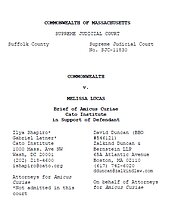Commonwealth v. Lucas
Learn more about Cato’s Amicus Briefs Program.
John Adams left his state a conflicted legacy. As a young man in 1765, Adams took to the Boston Gazette to protest censorship, reminding his readers that “liberty cannot be preserved without a general knowledge among the people,” and for that reason “none of the means of information are more sacred, or have been cherished with more tenderness and care by the settlers of America, than the press. Care has been taken that the art of printing should be encouraged, and that it should be easy and cheap and safe for any person to communicate his thoughts to the public.” Fifteen years later, Adams was called upon to write a constitution for the Commonwealth of Massachusetts, which provided that as “[t]he liberty of the press is essential to the security of freedom in a State; it ought not, therefore, to be restrained in this commonwealth.” Wise words from a wise man. But nearly 20 years later, Adams was no longer a young man, and no longer so wise. In 1798, Adams was an embattled and unpopular president, under constant fire from the nation’s papers. In response, he pushed through a law that made it a crime to “write, print, utter or publish … any false, scandalous and malicious writing or writings against the government of the United States.” Reviled as an unconstitutional affront to liberty, the Sedition Actwas so unpopular that it cost Adams a second term, and has served for over 200 years as a symbol of tyrannical overreach. Adams also gave his name to the courthouse where the Supreme Judicial Court of Massachusetts meets; that Court will now have to make a decision about which version of Adam’s legacy it will embrace. For almost 100 years, Massachusetts has had its own version of the Sedition Act, a law making it crime to publish “any false statement in relation to any candidate for nomination or election to public office, which is designed or tends to aid or to injure or defeat such candidate.” Cato has filed a brief pointing out just how absurd and unconstitutional this law is. No, not that brief, but if the law sounds familiar it should: Ohio had a similar law—until a trip up from the federal district court to the U.S. Supreme Court and back resulted it in being struck down. Statutes in Minnesota and Washington have suffered the same fate. These laws are a direct and indefensible attack on the freedoms protected by the First Amendment, and because John Adams was right when he described censorship as the “jaws of power … always opened to devour, if possible, to destroy the freedom of thinking, speaking, and writing,” it’s time for Massachusetts to follow suit. As a more modern president from the Commonwealth once said, the government cannot be “afraid to entrust the American people with unpleasant facts, foreign ideas, alien philosophies, and competitive values. For a nation that is afraid to let its people judge the truth and falsehood in an open market is a nation that is afraid of its people.”
